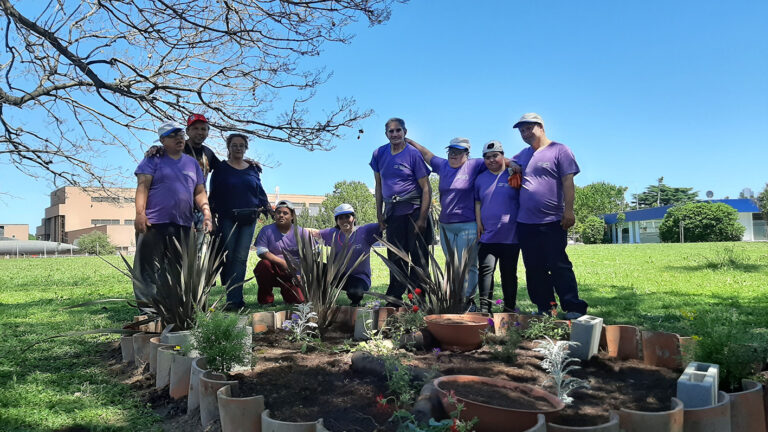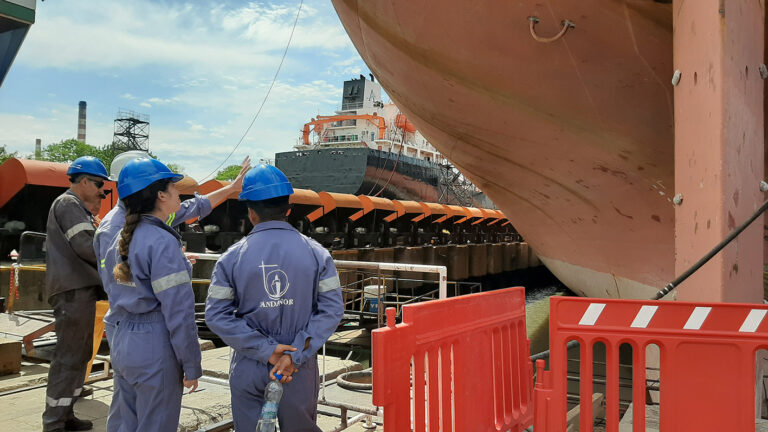Corporate Social Responsibility
Migration to Ultra High Pressure water jetting in surface preparation
Meeting the demands of the 21st century, CINAR is migrating to the UHP water jetting method for surface preparation using UHP L-300/4 units reaching 2800 bars and an MK3 robot. By doing so, it gains modern technology, security for its workers and reduction in the operation time stripping more square meters in less time.
By leaving the sandblasting process behind, environmental quality is improved reducing health hazards since workers are no longer exposed to particles resulting from the abrasive blasting materials.
Nuestra Señora de Fátima Institute
Dual Education System
Within the framework of the Work Learn Program, students served an apprenticeship in Tandanor.
Dual Education System is a new methodological approach within Technical Education. It consists of the collaboration among State-owned Industrial Companies to provide students with a professional experience by getting an apprenticeshipin Industrial Plants. The main goal is to provide students with real life work experience where they can apply academic and technical skills and develop their employability. Students should also learn and be aware of the daily problems arising in a certain type of industrial organization. This program supports students social and working integration so that they can develop and strengthen their own identity. It helps them solve economic problems for themselves or their families where lower-income households find studying a high expenditure. It also keeps them up-to-date with the equipment a technical school should have. Besides, by training our skilled personnel we help satisfy market demands.
PROFESSIONALISING PRACTICE
Since 2018, there have been Professionalising Practices for students of the last year of the Technical School that entitle them to a 200-hour program a year. New C.A.B.A Technical School curriculum has been adopted nationwide. These practices foster the development and strengthening of students’ knowledge and skills related to their future work profile. These activities will be aligned with the academic learning.
Differences between Dual Educational System and Professionalising Practices
Dual Educational System: It lasts 2 years. 20 hours a week. three days a week. The minimum age is 16 years old.
Professionalising Practices: Last year of Technical School. 200 hours a year. Four times a week. 18-year-old or 19-year-old students.
Both programs have the same objectives. The Dual System was only implemented in the City of Buenos Aires and the Instituto Nuestra Señora de Fátima was the only school included.
Professor Fernando Patruk, Dean of the Institute said “Seventeen students have had access to the these practices. They have had a remarkable performance and experience. They have effectively consolidated the knowledge acquired at school combining their practices to their whole educational program. We are deeply grateful that Tandanor is making this possible.”
Tandanor and Villa Ángela
Tandanor is working on Corporate Social Responsibility. It participates in severals programs and activities with different organizations of the community collaborating in forming responsible citizens.
As part of these activities, Tandanor celebrated a contract with Villa Ángela Foundation. They work on the inclusion of people with disabilities developing programs that involve the different therapeutic and pedagogical methods. They provide them with the tools necessary to exercise their rights by fostering integration and highlighting their dignity as human beings and developing their social, mental and physical well being. They also carry out informative activities for the community related to prevention of some disabilities and integration of the individual and their family from the terapeuthical, pedagogical and social perspective. Furthermore, training courses and workshops are available for people with disabilities and people who assist them. This organization fosters the creation of centers of attention, day care centers, training centers, etc. They teach every aspect of the disability from its origin to its social consequences.

In the signed agreement, gardening and landscaping activities are to be carried out in the shipyard by people with different disabilities. This is the way Tandanor collaborates with their remarkable work. It is important to highlight the commitment of the companies towards the community by CSR activities such as this agreement between Tandanor and Villa Ángela that allowed them to continue with their labor that had been jeopardized by the economic and financial crisis and even made them consider the shutting down of the organization.
Practices in Shipyards
In the framework of the signed agreement with the University of Buenos Aires, Tandanor offered the shipyard facilities to the Engineering School so that student could take “Practices in Shipyards I” which is one of the syllables of the Naval Engineering curriculum.

The objective is that students get familiarized with the facilities of a shipyard showing them all building, repairing and testing processes by interacting with the different work areas such as Production, Project Management, Syncrolift, Submarine, Shipbuilding, Quality, Environmental Health and Safety among others. To do so, students go to the shipyard every day during a four-month period.
